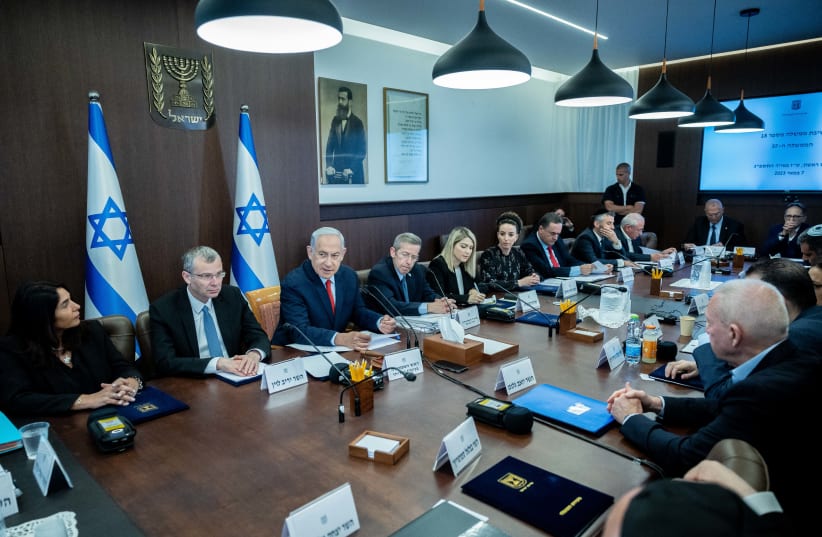The Israeli government on Sunday adopted a number of additional sections of the International Holocaust Remembrance Alliance’s (IHRA) definition of antisemitism that deal with “distortion and denial of the Holocaust,” as well as the “working definition of anti-Roma discrimination,” according to a joint statement by the Foreign Ministry and the Diaspora Affairs and Combating Antisemitism Ministry.
The IHRA definition of antisemitism was adopted already in 2017. The additional sections adopted on Sunday relate to the alliance’s decision on “Holocaust denial and distortion,” as received by the IHRA in 2013 as well as the working definition for “anti-Roma discrimination,” received in October 2020.
The IHRA definition has already been adopted by countries across the world. Foreign Minister Eli Cohen said that “the decision adopted today by the government will strengthen Israel’s standing in the international arena and help in the fight against antisemitism, as well as the fight against distortion and Holocaust denial.”
He added that “while the entire world is dealing with antisemitism, the Israeli government is sending a clear message. We must fight the distortion and denial of the Holocaust with all of the tools that are at our disposal.” He concluded that the Foreign Affairs Ministry and Israel’s embassies around the world “are committed to the daily fight against antisemitism and the preservation of the memory of the Holocaust.”
IHRA definition: One of the most essential tools to fight antisemitism
“The IHRA definition is currently one of the most essential and strategic tools for the fight against antisemitism, with an emphasis on ‘new antisemitism’ that strives to deny the legitimacy of the State of Israel to exist.”
Amichai Chikli
Diaspora Affairs and the Combating Antisemitism Minister Amichai Chikli added that “the IHRA definition is currently one of the most essential and strategic tools for the fight against antisemitism, with an emphasis on ‘new antisemitism’ that strives to deny the legitimacy of the State of Israel to exist.”
Chikli said that the “decision will help Israel in its efforts to get organizations and countries to withdraw their recognition of the BDS movement’s decisions concerning, among other things, the denial of the Holocaust.”
According to Chikli, the move “will help Israel in its efforts to get organizations and countries to withdraw their recognition of the BDS movement’s decisions concerning, among other things, the denial of the Holocaust.” In addition, the decision to add reference to the denial and distortion of the Holocaust “is very important, especially regarding the phenomenon of attributing positive attributes to the Holocaust, such as the false representation that the State of Israel was established thanks to the Holocaust – a statement that prime minister David Ben-Gurion fought against in the early years of the state.” Chikli asked to “congratulate the Foreign Affairs Minister and the people of his office on this joint decision.”
IHRA was established in 2000 at the initiative of then-Swedish prime minister Göran Persson. 35 countries are members of the alliance and 10 additional countries, as well as organizations, are observers and partners. Israel has been a member of the alliance since its foundation.
As part of the work of the experts in the organization, a number of basic definitions were drafted and adopted to deal with phenomena and issues that pose challenges at the international level for the preservation of the memory of the Holocaust, Nazi crimes and the fight against antisemitism.
The IHRA definition of antisemitism was adopted by the Israeli government in Resolution No. 2315 on January 22, 2017 and has since been used as an important tool in the work of Israel’s ministries and missions around the world in the international fight against antisemitism and the effort to promote Holocaust remembrance.
The IHRA definition for Holocaust distortion and denial, adopted in 2013, is intended to equip countries and entities with the tools to deal with the phenomenon of Holocaust denial. The definition is an expression of recognition by countries and organizations of the need to denounce distortion and denial of the Holocaust at the national and international level.
The IHRA definition of discrimination against the Roma people received in 2020, is intended to help deal with widespread hatred that also manifested itself in World War II, during which Nazi Germany marked this group for persecution and mass murder.

